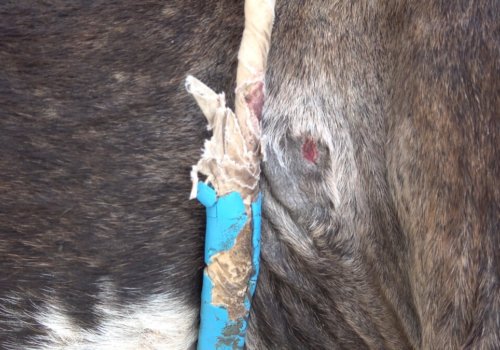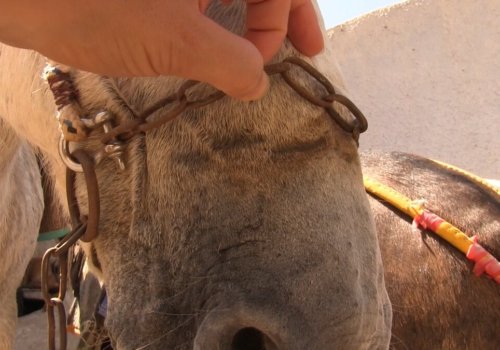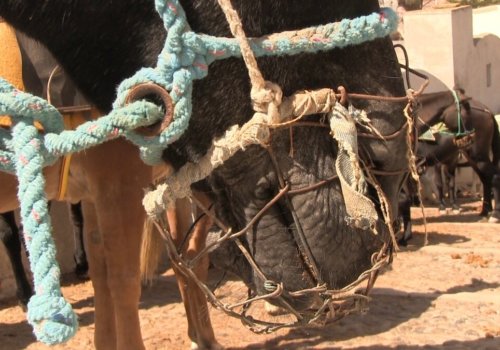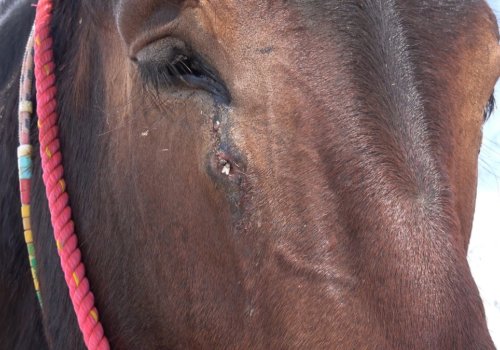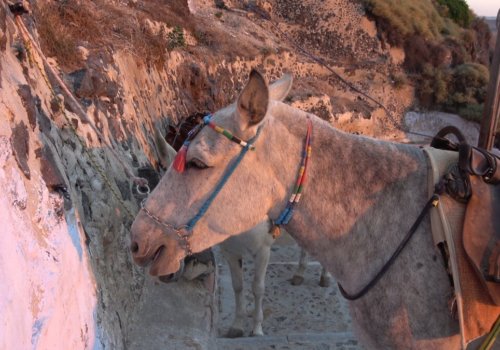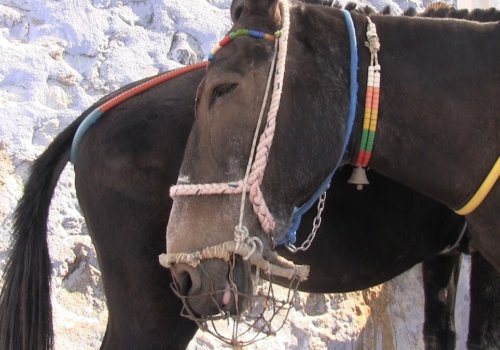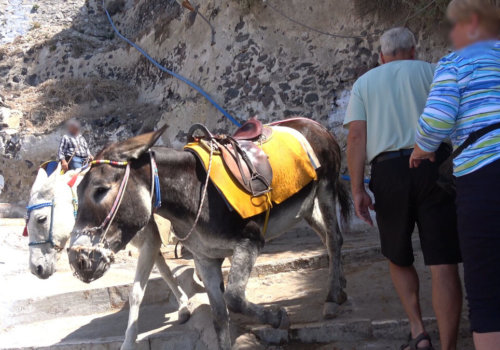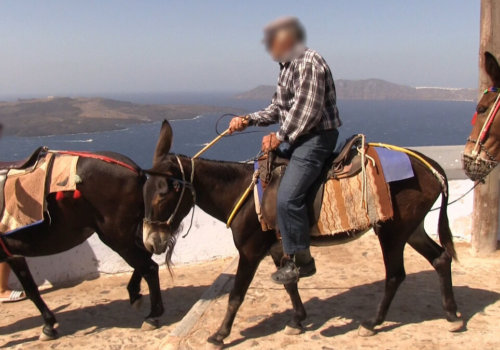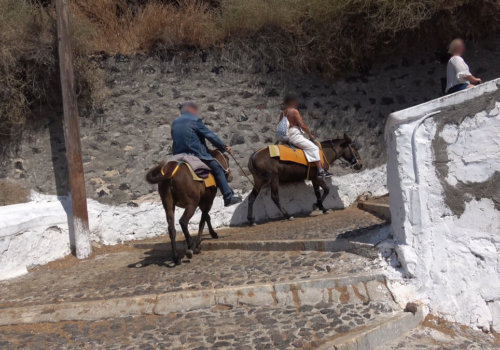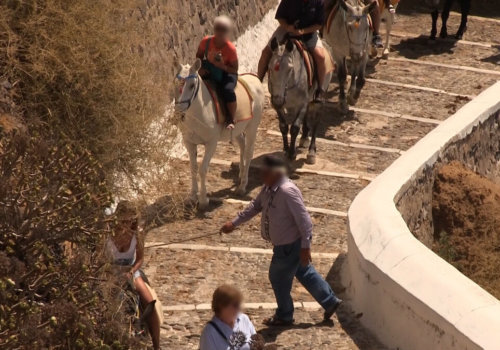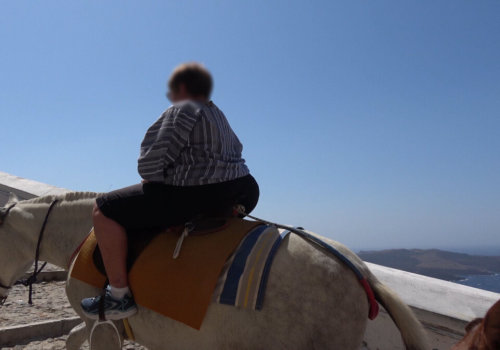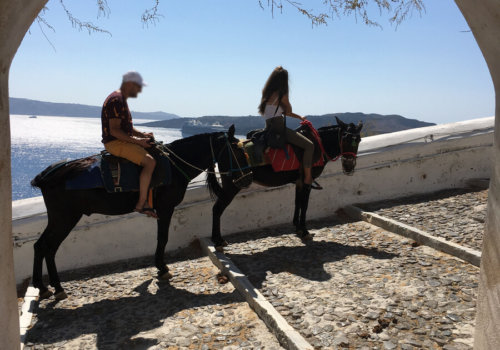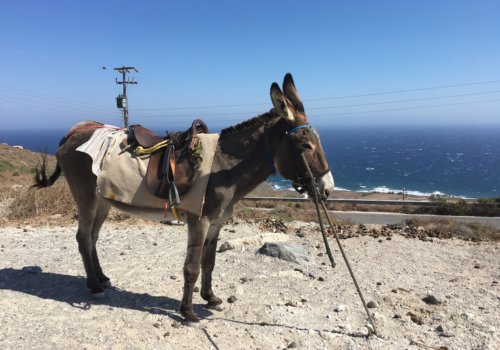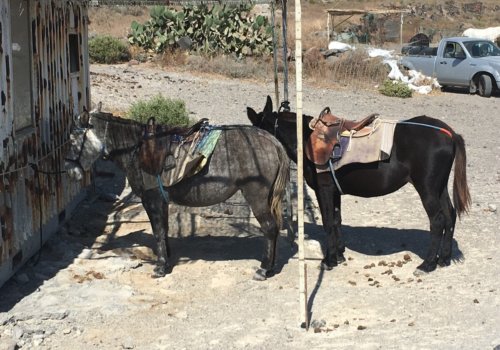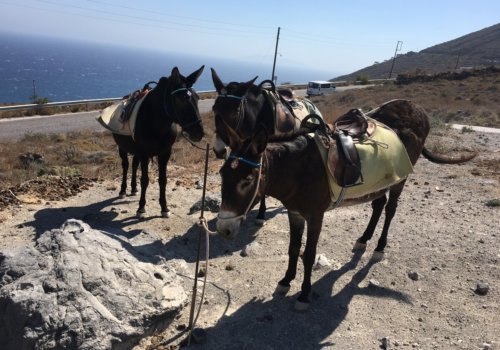New PETA Germany Investigation Reveals That Cruelty on Santorini Continues
Update: January 2020
A wide variety of measures, such as the release of PETA Germany’s most recent investigation in November 2019, protests in front of Greek embassies around the globe, a joint letter from PETA Germany and well-known Greek NGOs actively helping donkeys and mules on Santorini, and a letter from rock star Tommy Lee to the Greek agriculture minister, Makis Voridis, who oversees Santorini, have created enough pressure to cause the minister to comment on the accusations in a letter sent to Greek media.
After announcing stricter animal welfare laws and nationwide inspections in the 2020 summer season (including potential fines of up to 30,000 euros per violation), Voridis wrote in a statement, “In this way, we believe that the traditional character of the local communities will be preserved and strengthened, the economy improved, and the animals protected at the same time.”
However, because existing animal welfare laws are not being complied with, stricter regulations and inspections won’t improve the animals’ situation, let alone stop their suffering completely. This can only be achieved by amending the law to include a ban on the use of donkeys and mules for transport. Please join us in calling for an end to “donkey taxis” on Santorini.
On the Greek island of Santorini, about 100 donkeys and mules are used for carrying tourists from the port all the way up to the old town of Firá and back. They are forced to climb more than 500 slippery steps each way several times a day. Makeshift saddle girths chafe their sensitive skin. Every step is painful.
Open Sores and Bloody Injuries
Colourful accessories may divert clueless tourists‘ attention away from the lifelong suffering of these animals, as some of them look well cared for at first glance. However, many donkeys and mules bear scars and have open sores. Some suffer from eye injuries. Others are fitted with tight, sharp wire “muzzles“. Chains used as halters press into their flesh.
Tourists Endangered
Handlers beat the animals mercilessly despite their injuries in order to force them to keep going, back and forth. They don‘t want to miss out on any paying customers. This regularly leads to dangerous situations in which the skittish animals push past tourists. It would be unthinkable for the mules, who are all tied to each other, to slip.
Denied Food, Water, and Adequate Shade
When there are no customers, most donkeys and mules stand in the scorching sun – many tethered so tightly that they are barely able to brush away the swarming flies. And they are thirsty: there is only one token bucket of water on each end of the journey, but the animals tethered there can‘t reach it. They are not given any food throughout the day. Many donkey handlers are rough not only towards their animals but also towards pedestrians, and their tone towards their customers is also harsh. (“Finish, Madam!“)
PETA released footage about the suffering of donkeys and mules on Santorini back in 2018. But today the donkey handlers still manage to attract many tourists by advertising the ride as a “holiday experience“. It would be just as easy to use the animal-friendly cable car right next to the steps.
After our first exposé, the Greek government seemed to take notice, and it passed new laws to protect animals last year. However, this recent investigation showed that these laws are neither monitored nor enforced. At the end of the summer in 2019, animals were still carrying tourists of all weights although the law allows for a maximum weight of only 100 kilos. The donkeys and mules on Santorini continue to suffer.
Legal Background
PETA Germany took a close look at Greece‘s animal welfare laws to be able to show politicians why riding on donkeys and mules must be banned immediately. The legal situation is clear: the way animals are currently treated constitutes an ongoing violation of animal welfare regulations. The measures to protect donkeys and mules introduced in 2019 are merely minimum requirements that do nothing but ensure the animals‘ survival (at best). However, even these minimum requirements can’t be reliably observed by owners because of the conditions on the ground, which means that they can’t be efficiently enforced by the authorities in charge, either.
Irrespective of the widespread animal welfare violations found, the use of animals as a means of transport for tourists itself is relevant to animal welfare considerations. The pain and suffering the animals are forced to endure are disregarded in order to provide tourists with entertainment. This is particularly unacceptable because suitable, safe, humane means of transporting tourists to the old town of Firá are readily available.
What PETA Germany Demands
The use of donkeys and mules to transport tourists from the port of Santorini to Firá‘s old town is inevitably connected to pain and suffering for these animals and must therefore be outlawed. PETA Germany is in touch with the decision-makers in charge and will continue to inform the public in a campaign for such a law.
Furthermore, we are asking all holidaymakers never to ride on donkeys and mules. This “tradition“ is not a harmless holiday experience but cruelty to suffering animals. The time has come for Greece to create new laws to protect them.
